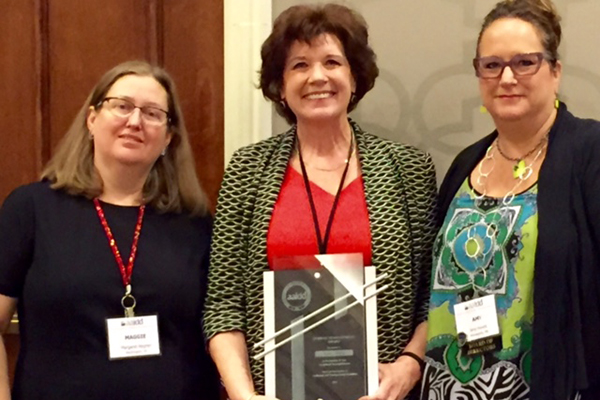
Humanitarian award
UD's Weiss receives Dybwad Humanitarian Award for fighting shock treatment
2:01 p.m., June 9, 2015--The University of Delaware’s Nancy Weiss has dedicated more than 30 years advocating for the compassionate treatment of individuals with intellectual and developmental disabilities. In June, her efforts were recognized when she received the Dybwad Humanitarian Award from the American Association on Intellectual and Developmental Disabilities (AAIDD).
The award is presented to individuals who have significantly promoted human welfare and social reform in ways that positively affect the lives of people with intellectual and developmental disabilities.
Honors Stories
National Medal of Science
Warren Award
Weiss, assistant professor of human development and family studies and director of the University’s National Leadership Consortium on Developmental Disabilities, has been a fierce advocate for this vulnerable population.
AAIDD cited Weiss for her work on behalf of children with autism spectrum disorders attending the Judge Rotenberg Education Center (JRC) in Massachusetts, where CBS reported last year that electric shock treatment is being used to modify behavior.
“Even though the United Nations has called what is done to children at the Judge Rotenberg Center torture, the U.S. has taken no action to make it illegal,” said Weiss.
Across the country, agencies that serve people with disabilities have implemented methods that are more effective in managing dangerous or disruptive behaviors and that do not inflict pain on or dehumanize people with disabilities.
“As horrifying as it is to imagine, this controversial approach to behavior management is still in practice today. Students at this facility live a life of constant terror,” said Weiss.
After visiting this facility in 1993, Weiss felt the need to take action. She’s been leading a national advocacy effort against these human rights abuses ever since.
“I have known Nancy for 30 years and have yet to meet anyone else as impassioned about protecting the dignity of people with intellectual and developmental disabilities. Her relentless work to eradicate the use of aversive procedures makes her a national heroine in my book,” said Nancy Thaler, executive director of the National Association of State Directors of Developmental Disabilities Services.
In 2014, Weiss petitioned the Food and Drug Administration (FDA) to hold a hearing to ban devices similar to the ones used at the Judge Rotenberg Center. She also documented the mistreatment of people with disabilities and successfully solicited 31 national disability organizations to petition for the elimination of the use of electric shock and other painful or aversive procedures, including seclusion, prolonged restraint and food deprivation – all considered inhumane and unnecessary methods of behavior modification.
The letter was sent to seven federal agencies as well as to Amnesty International, Human Rights Watch, and Physicians for Human Rights. In response to Weiss’s letter the U.S. Department of Justice launched an investigation of the Judge Rotenberg Center.
In addition to her human rights advocacy, Weiss serves as director of UD’s National Leadership Consortium on Developmental Disabilities. The consortium focuses on the development of leaders who are passionate about quality, have the skills needed to run solid not-for-profit businesses and government agencies and have a solid commitment to progressive values that assure lives of meaning and impact for people with disabilities.
“Nancy's passionate, committed leadership has been a consistent force for positive change for over three decades,” said Sharon Lewis, principal deputy administrator of the Administration for Community Living, U.S. Department of Health and Human Services. “In her work at the leadership institute, Nancy has educated thousands of emerging leaders with her common sense wisdom and practical thinking, always focusing on the most important thing — ensuring that people with developmental disabilities are supported to live lives filled with love, dignity and purpose.”
Article by Alison Burris
Photo courtesy of the Weiss family








